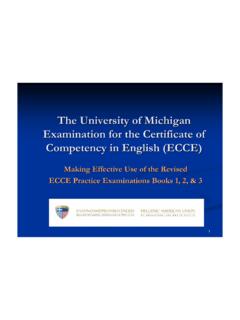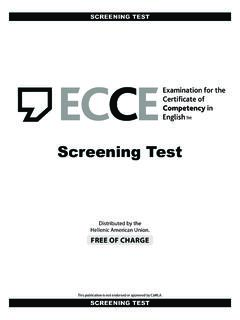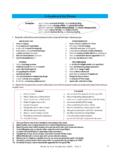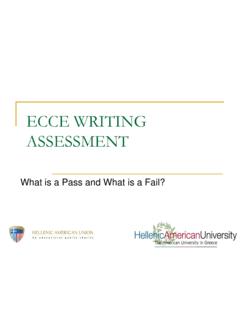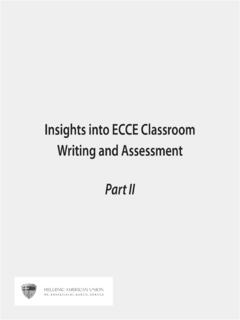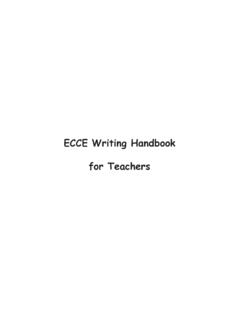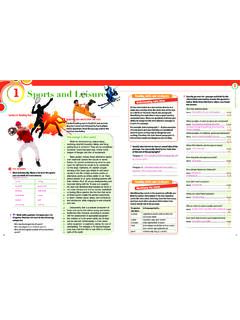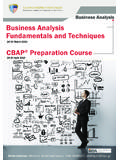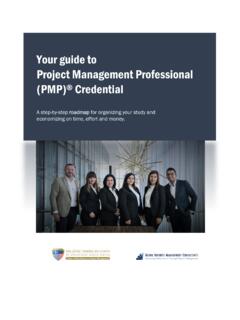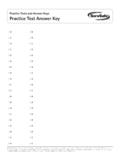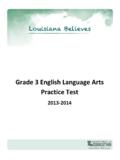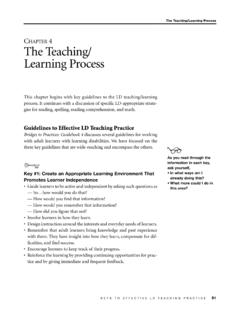Transcription of ECCE - Hellenic American Union
1 ECCEE xamination for theCertificate ofCompetency inEnglish MICHIGAN ELITESTINGTESTING AND CERTIFICATION DIVISIONENGLISH LANGUAGE INSTITUTE UNIVERSITY OF MICHIGAN Copyright 2006 by the Testing and Certification Division, English Language Institute, University of Michigan, Ann Arbor, Michigan Regents of the University of Michigan: David A. Brandon, Laurence B. Deitch, Olivia P. Maynard, Rebecca McGowan, Andrea Fischer Newman, Andrew C. Richner, S. Martin Taylor, Katherine E. White, Mary Sue Coleman (ex officio)Practice Testsfor the ecce acknowledgementsThe ecce Practice tests book is the result of contributions from past and present ELI Testing Division research staff who wrote, edited, and pretested items/materials that appear in the book. The Testing Division would like to specifically acknowledge the following individuals for their efforts: Shelley Dart, Mary Spaan, and Amy Yamashiro for the selection of items included in each practice test; Aaron Ohlrogge and Mary Spaan for writing the annotations section; Lindsay Devine, Eric Lagergren, Lauren Naimola, Katherine Ragsdale, and Barbara Wood for their contributions to the production of the audio files and to the design and layout of the book; and to Diane Larsen-Freeman, director of the English Language Institute, and Barbara K.
2 Dobson, associate director for testing, who provided encouragement and support for this informationFor ordering copies of this book and the accompanying CDs please contact the ecce test center nearest you. For a list of test centers visit the ecce section of our Web Language InstituteTest Publications401 East Liberty Street, Suite 350 Ann Arbor, MI 48104-2298 USAP hone: : 2006 English Language Institute, University of Michigan. All rights reserved. No part of this book may be reproduced in any form, or by any means, without advance permission in writing from the for the ecce what is the ecce ?The Examination for the Certificate of Competency in English ( ecce ) is a standardized high-intermediate level English as a foreign language (EFL) examination. It is developed and scored by the English Language Institute of the University of Michigan (ELI-UM) and is administered by over 130 authorized test centers around the world. The content and difficulty of the ecce aims at the B2 level (independent user, Vantage) of the Common European Framework of ecce tests four skill areas: listening, reading, writing, and speaking.
3 It emphasizes the ability of the examinee to communicate effectively in English. The ecce may also be used as a bridge to a more academically oriented exam, such as the University of Michigan Examination for the Certificate of Proficiency in English (ECPE). Examinees can use the ecce to document their level of English for personal, public, educational, and occupational purposes. For example, in several countries, the ecce is used as an exit exam at the end of a course of study. In addition, it is also used to provide evidence of one s level of English to employers. Successful examinees may find an ecce certificate useful when applying for a job or a promotion, or when conducting business with companies is committed to excellence in its tests , which are developed in accordance with the highest standards in educational measurement. All parts of the examination are written following specified guidelines, and items are pretested to ensure that they function properly.
4 ELI-UM works closely with test centers to ensure that its tests are administered in a way that is fair and accessible to examinees and that the ecce is open to all applicants who wish to take the exam, regardless of the school they does not recommend any specific course of study to be taken in preparation for the ecce . The best preparation is through the general study and use of and content of this bookThis book is intended to help students preparing for the University of Michigan Examination for the Certificate of Competency in English ( ecce ). The book contains two complete practice tests , followed by answer keys and annotations that explain the items. The practice tests are intended to familiarize test takers with the format and content of the ecce . The items used have been pretested and are at the target ability level (level of difficulty) of the ecce . The sample answer sheet is designed to give students practice using this response format to multiple-choice items, as some students may not be familiar with this type of to use this bookThe practice tests in this book can be used in a test preparation class by teachers and can also be used by individuals for self-study and self-assessment.
5 The tests are not designed to be memorized, but to be studied to provide practice with particular types of tasks and testing methods. Memorizing these practice tests will not guarantee success on the official ecce , and these tests should not be used as the primary text for a test preparation course. Rather, they should be considered supplemental to other materials and textbooks that concentrate on the oracy and literacy skill areas measured in the Practice for the ECCEThe following chart illustrates the format and content of the of itemssPeaking15 minutesA structured oral interaction occurs between the examinee and the oral examiner. The interaction involves a brief interview and a visual taskslistening30 minutesPart I (multiple choice)A short recorded conversation is followed by a question. Answer choices are shown as II (multiple choice)A recorded radio interview is broken into segments. Groups of questions follow each segment, with brief printed answer , VocaBUlary, reading80 minutesGrammar (multiple choice)An incomplete sentence is followed by a choice of words or phrases to complete it.
6 Only one choice is grammatically (multiple choice)An incomplete sentence is followed by a choice of words to complete it. Only one word has the correct meaning in that (multiple choice)Part I: A short reading passage is followed by comprehension II: Short texts are presented as advertisements accompanied by III: Longer related passages are accompanied by comprehension minutesA short excerpt from a newspaper, memo, or letter is presented as a writing topic. Examinees can choose to write either a letter or an essay tasktest contentPractice for the ecce Materials needed: Approximately 3 hours of uninterrupted time for listening, GVR, and writing A timing device, such as a clock or stopwatch. It is important that the time limits given for each section are followed so that students get practice working under timed conditions. An answer sheet or a piece of paper numbered 1 through 50 (for listening) and 51 through 150 (for GVR) A CD player to play back the listening test A pencil A piece of paper for the writing section1.
7 First, students should fill out the information sections of the answer sheet. They should print their names and other information in the blocks on the left side of SIDE 1, then use a pencil to fill in the corresponding circles. They should be sure to fill in each circle completely, and not to fill in more than one circle in each column. Then they should fill in the information at the top of SIDE 1 (name, etc.).2. Listening: Students should look at the test booklet as they listen to the instructions and examples. The instructions and examples may be repeated as often as necessary, but once the actual test questions are started, the recording should not be paused. There is a timed pause after each question so that students will have enough time to mark their answers on the separate answer sheet. During Part II of the listening section, they may take notes in the test booklet but continue to mark their answers on the separate answer Grammar/Vocabulary/Reading (GVR): Take as much time as needed to read the instructions and examples, then begin the test.
8 Allow 80 minutes to take the test and mark answers on the separate answer Writing: Read the instructions, then allow 30 minutes to write either a letter or an essay in Scoring: After students have finished the test, they may check their answers to the listening and GVR sections using the scoring key. To achieve passing level, they should answer about 65% of the problems correctly. This is a score of 32 33 for listening and 65 for GVR. A teacher can review the writing responses, following the scoring rubric available on the Web site. However, remember that the actual ecce writing section papers are scored at ELI-UM by trained raters, and that teachers evaluations of the writing section might not correspond to ELI-UM s The speaking section can be practiced separately. Teachers may use the picture prompts following each practice test in this book for speaking practice and can refer to the scoring rubric available on the Web site to evaluate their students speaking ability.
9 InstrUctions for taking tHe Practice testsPractice Test 1 for the ecce eXamination for tHecertificate of comPetencyin englisHPRACTICE TEST 1 Practice Test 1 for the ecce instrUctionsdo not Begin tHis section Until tHe eXaminer Has Played tHe recording of tHese instrUctions and iThis is a test of your ability to understand spoken English. You will hear short conversations. After you hear each conversation, you will be asked a question about what you heard. The answer choices in your test booklet are shown as pictures. Mark your answers on the separate answer sheet. Do not write in the test booklet. Here is an example:EXAMPLE:LISTENING LISTENING LISTENINGaBcThe correct answer is C, because the woman will need to take a taxicab. The museum is not close enough to walk to and she doesn t have enough time to take a will hear each conversation only once; the conversations will not be repeated. Please be very quiet and listen carefully. Remember to mark all your answers on the separate answer sheet.
10 You should mark A, B, or C. There are 30 questions in Part you have any questions before you begin? 2 Practice Test 1 for the ecce $2020$$$22$251$$1$$20$$20$$5$$ LISTENING LISTENING A B CPractice Test 1 for the ecce LISTENING LISTENING A B C Practice Test 1 for the ECCE52511$$$$ LISTENING LISTENING A B CPractice Test 1 for the ecce 1263921548710111263921548710111263921548 71011honeyUNIVERSITY NEW LISTENING LISTENING A B C Practice Test 1 for the LISTENING LISTENING A B CPractice Test 1 for the ecce GRADES 12 63921548710 11 12 63921548710 11 12 63921548710 11 15 minutes 30 minutes 1 hour LISTENING LISTENING A B C 8 Practice Test 1 for the ecce instrUctionsdo not Begin tHis section Until tHe eXaminer Has Played tHese instrUctions for iiImagine you are listening to a radio interview. You are going to hear someone from a radio station interviewing the director of an international food festival. First, you will hear about when the event will be held.
